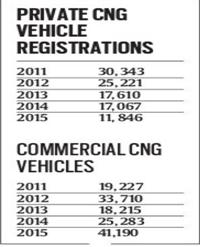Delhi: In 5 yrs, sale of CNG vehicles slides by 61 per cent
While CNG and diesel vehicle sales continue to dip, transport department data shows the
registration of commercial CNG vehicles increased by 54 per cent – from 19,227 in 2011 to 41, 190 in
2015.
Despite rising concern over air pollution, and the promotion of cleaner fuels like Compressed Natural
Gas (CNG), for five years now, the sale of private CNG vehicles has fallen sharply. Between 2011 and
2015, private CNG vehicle registrations declined by 61 per cent.
In response to an RTI application filed by The Indian Express, the Delhi transport department
divulged that CNG registrations fell from 30,343 in 2011, and then dropped steadily over the next
four years to 25,221 in 2012, 17,610 in 2013, 17,067 in 2014 and 11,846 in 2015. As compared to
2011, registrations have fallen by 61 per cent in 2015.
The data shows registrations in private vehicles, however, saw a spike when the Delhi government
implemented the odd-even road rationing scheme in January this year.
The Indian Express July 2 had reported that the sale of diesel cars in Delhi had sharply declined over
the last 15 months after mounting pressure from the Supreme Court and the National Green
Tribunal (NGT). The data on diesel vehicles showed a 40 per cent dip in registrations in the first
quarter this year compared to 2015.
While CNG and diesel vehicle sales continue to dip, transport department data shows the
registration of commercial CNG vehicles increased by 54 per cent – from 19,227 in 2011 to 41, 190 in
2015. Figures show the city has seen an increase in the annual registrations of commercial CNG-
fuelled vehicles, which include taxis, autorickshaws and light goods vehicles.
Analysts attribute the initial increase of CNG cars to the Commonwealth Games late in 2010 when
the Sheila Dikshit government promoted it as a clean fuel, not only for contract and stage carriage
buses, but for commercial light vehicles like taxis as well, besides the usual autorickshaw and DTC
bus registrations.
But increasing parity between CNG and diesel, slow network expansion over the years and fluctuating prices of CNG conversion kits may have caused consumers to shift preferences to petrol or diesel.
The fall in preference for private cars could be because of the price differential between CNG and diesel narrowing. Indraprastha Gas Limited (IGL) said the rise in prices of CNG vis-a-vis diesel might have affected sale and registration of private CNG cars in a particular year.
However, figures in the RTI also show that registrations of private diesel vehicles have been steadily falling over the past five years. This suggests buyers were moving from CNG to petrol, which might be a little expensive as an option, but is less likely to be phased out by the government and the courts which have been cracking its whip on diesel.
An official from an auto manufacturer attributed the shift towards petrol vehicles to the falling difference between diesel and CNG vehicles. Data shows diesel and CNG differed only by Rs 2 in 2013 compared to Rs 20 in the preceding two years. At present, diesel in Delhi is Rs 54.7 and CNG is 36.85.
Also, converting one’s petrol fuelled car to CNG is a possibility but converting diesel to CNG is not permitted in Delhi-NCR as of today.
Other reasons behind the fall in private CNG vehicles being registered might be attributed to fluctuating prices of CNG kits which are used to convert petrol-fuelled vehicles to CNG, analysts said. A transport department official said, “Fluctuations in manufacturing of factory-made CNG car models are a probable reason and long queues at CNG gas stations also act as a deterrent for many buyers.”
IGL, however, said they had set up several stations during the Commonwealth Games preparations in the city. In 2011-2012, there were 308 stations in the Delhi and NCR which increased to 324 the next year. It remained almost unchanged over the next two years till the number went up to 340 in 2015.
“As of today, there are 414 stations in the region, following a directive by the Petroleum Ministry to build 90 more stations,” a spokesperson said. The ministry has been pressurised to set up more CNG stations following court orders against diesel fuelled vehicles. The court orders not only encouraged a push towards CNG, they also forced the government into taking anti-pollution schemes like the odd-even road rationing project.
Auto manufacturers cited long queues at CNG stations as a reason as well. “After court orders, all taxis and public transport in Delhi are now CNG fuelled. This will put consumers off the fuel since it means longer queues and waiting at stations in Delhi.
The CNG network is not enough at the moment,” sources in an auto manufacturer said.
The road rationing project exempted CNG cars from inclusion into the rule which ensured cars with registration numbers ending with odd and even numbers stayed indoors on alternate days.
The move resulted in a spurt in the number of private CNG cars being bought and registered.


